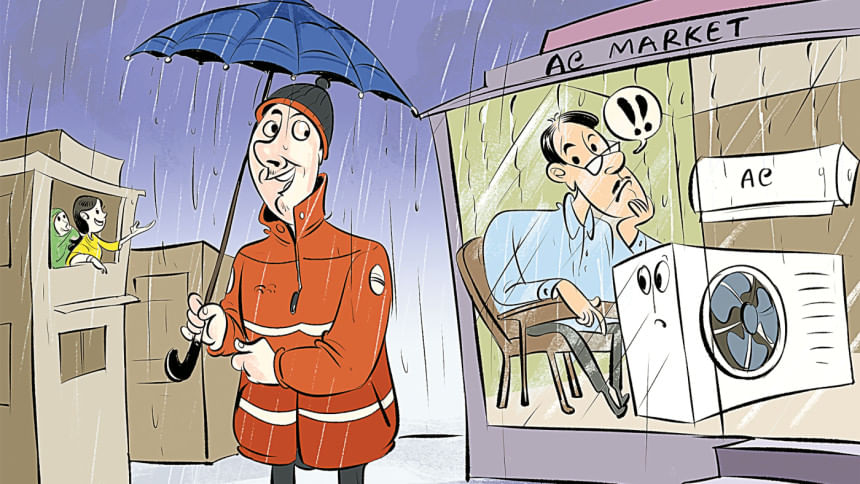AC demand cools off amid rain, mild temperatures

Air conditioner (AC) sales slumped this summer, as milder temperatures compared to previous years and frequent rains meant fewer households felt the need to invest in cooling appliances.
Retailers and distributors say sales fell by about 30 percent compared with last year. Their estimate suggests units sold dropped to 4-4.5 lakh this year from 6 lakh last year.
This downturn contrasts sharply with 2023 and 2024, when long spells of sweltering heat drove demand so high that buyers often had to wait days for installation slots. In Dhaka, AC technicians were so overstretched in the summer last year that new purchases had to wait for four to five days for installation.
Then, the mercury regularly touched 36°C in April.
This year, however, the temperature stayed between 32°C and 33°C in April and May, the hottest months of the year, according to the Bangladesh Meteorological Department.
In July, rainfall reached 564 millimetres, 23.5 percent above the historical monthly average.
For the local AC market, the weather pattern was a heavy blow. Already battling inflation and cautious consumer spending, the sector faced a sudden fall in demand.
"No prolonged hot spell and continuous rain spells in July meant that consumers felt less urgency to invest in cooling appliances," said Nurul Afser, deputy managing director of Electromart Ltd, which markets the Gree brand AC.
"AC demand has taken a noticeable hit this year," he added.
Electromart depends on the AC segment for most of its revenue, and Afser said the slowdown has left a "substantial impact" on business. Bulk orders from corporate clients and public institutions have also fallen.
In the AC segment, Singer Bangladesh has also seen similar pressure this summer.
"The AC industry saw more than a 10 percent decline this year due to cooler weather and unusually high rainfall," said Syed Sabbir Zaman, head of product. "This has affected the entire sector, including leading brands like Gree, Walton and Singer."
He said even aggressive price cuts have failed to revive the market. "Most companies have not matched last November's sales even by August this year -- which is a clear sign of slowdown."
Tanvir Rahman, chief business officer of Walton Air Conditioner, said demand had grown in double digits for a decade, thanks to local production that made ACs more affordable for the middle class.
This year, though, sales fell. "This is largely due to a decline in public and private investment, which directly affects the demand for bulk AC purchases," he said.
Domestic home appliance maker Jamuna Electronics, which invested Tk 18 crore in a fully local AC production line, has also been hit.
"We built a complete in-house production line, but the market has not responded as expected," said Salim Ullah Salim, director of marketing at Jamuna Electronics.
Despite weaker demand, AC prices, however, have climbed. A 1-tonne unit now costs Tk 60,000-Tk 65,000, up from Tk 50,000-Tk 55,000 a year ago, while premium brands reach Tk 1.2 lakh.
Salim blamed higher dollar rates, surging raw material costs and freight charges.
At Esquire Electronics, which represents the Japanese brand Hitachi, corporate orders are drying up.
"The heat did not last, and inflation has squeezed disposable income. People are not spending on non-essential items like ACs," said Esquire Electronics Senior General Manager Manzurul Karim.
He said project-based demand has nearly vanished. "Government development has slowed, and no major new projects have been launched. Even ongoing ones faced funding issues," he said.
Esquire's rural and peri-urban sales also fell. "We used to sell 50,000-60,000 units annually through such channels. This year it is down to around 30,000."
Karim pointed to rising competition from budget-friendly Chinese and local brands. "Consumers are shifting from premium models to cheaper alternatives due to tighter budgets."
Still, he remained cautiously optimistic. "It has been a difficult year. But with political stability and economic recovery, we expect demand to pick up gradually."

 For all latest news, follow The Daily Star's Google News channel.
For all latest news, follow The Daily Star's Google News channel. 



Comments